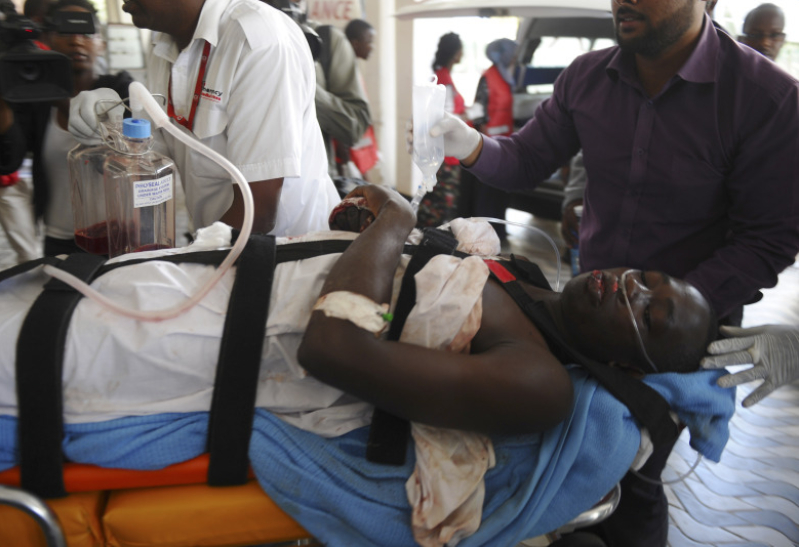
Students who survived last week's deadly attack on Garissa University College in Kenya have recalled in horrifying detail how the Muslim terrorists targeted Christians, slaughtering 148 believers in the 15 hour massacre.
On Thursday, April 2, five heavily armed gunmen affiliated with the Islamic extremist group Al Shabab stormed the school in the early morning hours. Their first target was a Christian prayer meeting; of the 29 students there, just seven survived.
"We were praying," Duncan Obwamu, 25 told the AFP. "We were in a circle in the room holding hands." First, the barrel of a gun appeared at the door before firing, killing a young woman leading prayers. A Shabab gunman stepped into the room and continued firing.
"He didn't say anything, but you could see from the look on his face he was very happy," he said. Obwamu recalled how, after being hit in the arm and shoulder, he lay in blood of other students, staying very still as the gunman kicked the bodies to be sure they were dead. "I heard him laugh as he communicated with the others outside. He was very happy about what he'd done."
For the next two hours, the Shabab fighters went through the college dormitories, asking terrified students if they were Muslims or Christians. If they were Christians, they were mercilessly killed.
"They started questioning the students whether they were Christians or not before shooting," one Christian student, whose name was withheld for security, told the AFP.
He recalled how he and his roommates heard the gunmen shout, "We are Al Shabaab."
"I even heard some of my fellow students reciting verses from the Quran as the attackers moved close by then," he said. "That is when I was shot on my left hand, but I managed to escape to a nearby military base, then was taken to the hospital."
Another student named Nyabwengi, recalled how, while in hiding, he heard his best friend beg for his life, pretending to be a Muslim. When the friend was unable to recite a Muslim prayer, he was fatally shot, Nyabwengi said.
"I heard them shouting, 'We've come to kill and be killed.' They would go and bring some students out of the dormitories and shoot them. [The students] were told to lie down, then I'd hear gunshots, gunshots and crying."
Speaking to Morning Star News, one Christian pastor who lives near the Garissa recalled the eerie silence surrounding the University during the attacks.
"I just heard several gunshots as I woke up in the morning, and this continued for several hours within the university compound, which is close to my church," the pastor said. "What shocked me was that there was no noise of shouts or screaming coming from the university."
The church leader said that after talking with the wounded patients at the hospital, he was convinced that Christians were targeted.
"It was a selective kind of attack, as many Muslims went unhurt," he said.
The attacks went unimpeded for nearly three hours before any help arrived, sparking outrage among the campus of mainly Christian students and the local community.
"I was just praying [to] God that the [Kenya Defense Forces] would come," recalled Stanley Muli, 22. "I was just thinking how come they have taken so long, because the barracks are near."
He explained that Garissa is located in a predominantly Muslim area just 90 miles outside the notoriously violent Somalia, thus making it particularly vulnerable to terrorism.
"We were fearing that if these people [Shabab] came, they could kill many, many Christians," said Muli, who had been shot in the thigh but survived in his hiding place. "[The government] failed to protect us. We are angry, because we lost some of our best friends. We think, 'How come security wasn't there when we were are the university?' They took no care."
Despite the government's failure to protect the University from the initial attacks, Kenyan President Uhuru Kenyatta warned that his administration will "respond in the severest ways possible" to the slaughter, and will "fight terrorism to the end."
The country's "security forces are pursuing the remaining accomplices. We will bring all of them to justice. ... We are also in active pursuit of the mastermind and have placed a reward for his capture," he added.
On Sunday, Kenya fighter jets bombed al-Shabaab bases in neighboring Somalia on Sunday night as part of that initiative. According to BBC News, the air strikes targeted two camps in the Gedo region used by the Islamic extremists to cross into Kenya.
Also on Sunday, Christians in Kenya and around the world mourned the slain students, honoring them in their Easter prayers.
"There have been so many martyrs in the last year. On Maundy Thursday, three days ago, around 150 Kenyans were killed because of being Christian, Archbishop of Canterbury Justin Welby, the leader of the Anglican Communion, said in his Easter message. They are witnesses, unwilling, unjustly, wickedly, and they are martyrs in both senses of the word."
He added: "These martyrs too are caught up in the resurrection: their cruel deaths, the brutality of their persecution, their persecution is overcome by Christ himself at their side because they share his suffering, at their side because he rose from the dead."






